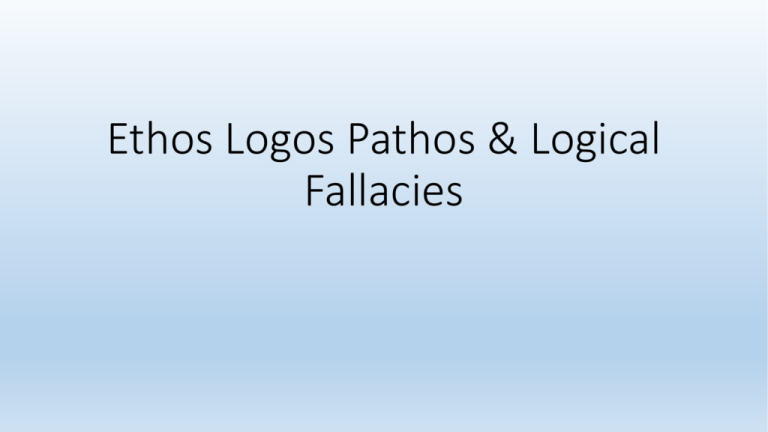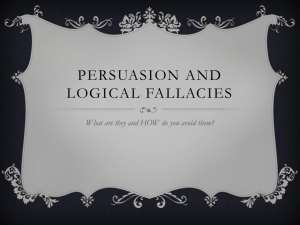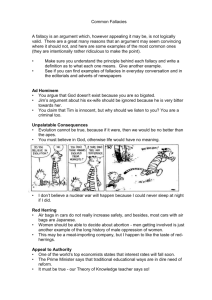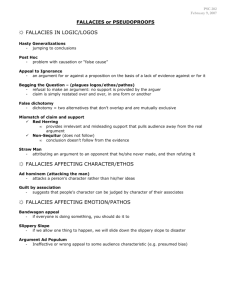File - Karen Zandarski
advertisement

Ethos Logos Pathos & Logical Fallacies Reading Quiz Pre Test Read Post Test http://www.lib.usm.edu/legacy/plag/plagiarismtutorial.php What are Logical Fallacies? “A fallacy is, very generally, an error in reasoning. This differs from a factual error, which is simply being wrong about the facts. To be more specific, a fallacy is an "argument" in which the premises given for the conclusion do not provide the needed degree of support.” The Nizkor Project Types of logical fallacies Jumping on the bandwagon: Using the term everyone in your argument when a writer makes and argument. Often many people will agree with your argument, but seldom will everyone. The only way to prove that everyone agrees with you is to have asked everyone. Everyone in the United States is tired of gun violence and it is time to enact laws to stop it Personal Attack: Instead of attacking the reasoning the writer attacks the person behind the claim. People who support gun control are stupid. Slippery Slope: This fallacy claims that one action will lead to a whole series of undesirable events – without offering any proof. When you see a claim where the outcomes seems to be a stretch from the beginning ask yourself, “Will this first action definitely lead to the next?” If everyone carried a gun, there would be no more mass shootings. Emotive Language: This fallacy appeals to the readers emotions without supporting the argument Can you imagine how the parents of the children from Sandy Hook feel waking up every day without their child? Either or Thinking: There are often more than two outcomes to an argument. When you see an either/or statement in your reading ask yourself, are there really only two possible outcomes? When you are writing, remember that there are really many possible outcomes to an argument. Either we ban all gun sales now or mentally ill people will continue to shoot school children. Hasty Generalizations: This is jumping to conclusions. If we enact tougher gun control laws there will be no more violence in schools. Red Herring: This fallacy uses a distraction to get the reader to think about something other than the argument. Richard Nixon’s Checkers Speech https://www.youtube.com/watch?v=jXnwW-rGWsU Greek philosopher Aristotle divided the means of persuasion, appeals, into three categories--Ethos, Pathos, Logos. Ethos (Credibility), or ethical appeal, convincing by the character of the author. We tend to believe people whom we respect. Problem: to convince the reader that you are someone worth listening to. Use credible sources to support your argument. Pathos (Emotional) Persuade by appealing to the reader's emotions. Texts ranging from classic essays to contemporary advertisements use pathos, emotional appeals to persuade. Language choice affects the audience's emotional response. Emotional appeal can effectively be used to enhance an argument. Logos (Logical) Persuade by the use of reasoning. • Facts and Statistics to support your claim. • https://www.youtube.com/watch?v=rFcCFEeOEeg https://www.youtube.com/watch?v=rFcCFEeOEeg





